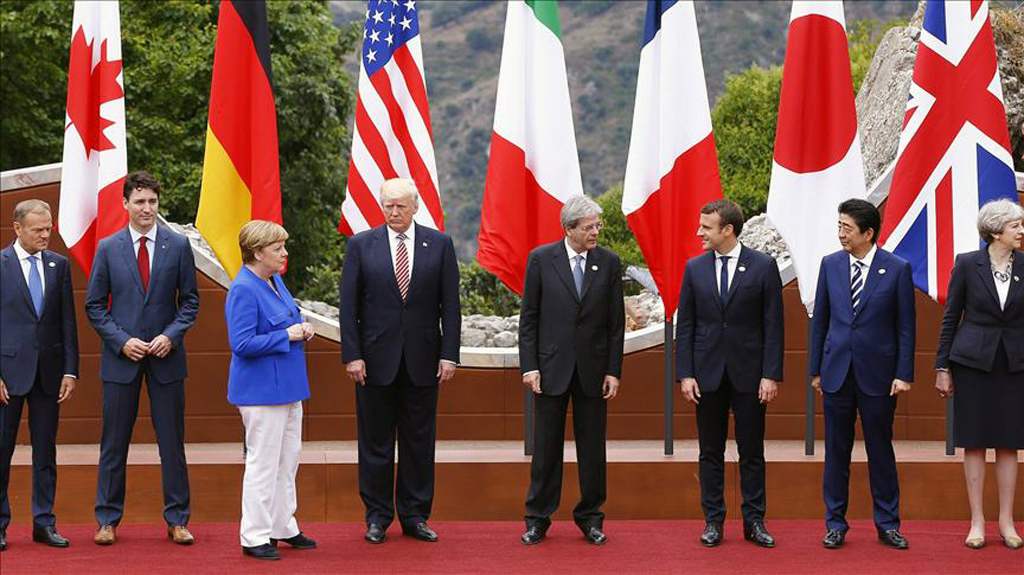
Trump and the erosion of American hegemony
Trump's unilateralist foreign policy is leading the U.S. down a self-destructive path while increasing the competition and tension between global powers
Share
Facing many military, political and economic challenges worldwide, the United States has begun to lose its global hegemony, with U.S. President Donald Trump's election further contributing to the trend. As a right-wing populist and ultra-nationalist, Trump declared "America First" as his main political discourse. However, his unilateralist foreign policy moves have led the U.S. down a self-destructive path.
Though the U.S. maintains its destructive power, it has lost its constructive influence. To be a hegemon, it needs consent from and to be recognized by other states; but the U.S. has not pursued an acceptable policy according to other global and regional actors. Under Trump's leadership, the U.S. has adopted unilateral policies on a global scale, while alienating all rival and partner states alike. Furthermore, the U.S. is hesitant and/or unable to provide global public goods anymore. It does not contribute to the multilateral initiatives of global institutions. On the contrary, Washington has been preventing their activities. It intends to delegitimize international platforms such as the U.N. and the World Trade Organization (WTO), both established after World War II. That is, the Trump administration now is the biggest threat to the Pax Americana order created in the 1940s.
Here are some of the foreign policy developments of the Trump administration that contributed to the isolation of the U.S. and the increase of competition and tension between the global powers. Trump is unilateralist and in principle rejects all multilateral international platforms. As an ultra-nationalist and populist politician, he opposes universal norms, principles, rules and agreements.
As soon as Trump came to power, he withdrew the U.S. from the Paris climate agreement and refused to take measures concerning environmental protection. Subsequently, Trump unilaterally abandoned the Trans-Pacific Partnership (TPP), an agreement targeting economic cooperation between East Asian countries and the U.S. Another unilateral move of the Trump administration in economy was the increased metal tariffs, which caused another crisis in the global economic system.
Similarly, he unilaterally withdrew the U.S. from the Iranian nuclear deal signed by Iran and the P5+1 – the five permanent members of the U.N. Security Council; namely Britain, China, France, Russia and the U.S. plus Germany. By doing so he disrespected the previous administration and damaged trust toward Washington. In spite of the U.N. Security Council's decisions and world public opinion, Trump decided to move the American Embassy in Israel from Tel Aviv to Jerusalem, recognizing occupied Jerusalem as the capital of the Israeli state. With these two moves in the Middle East, the Trump administration has contributed to political polarization and instability in the region.
And finally, Trump, who of late has completely disregarded the common values of U.S. allies, refused to sign the G-7 summit's statement of shared values. The leaders of Germany, France, Canada and Japan openly criticized Trump's departure from the G-7 Summit held in Canada last Saturday. The G-7 countries tried to emphasize their opposition to economic protectionism, an economic principle frequently implemented by Trump, as Trump refuses to maintain the "rules-based international trading system." Trump has been trying to revise and change almost every international organization – including the U.N. and all its affiliated organizations – to make them subservient to the United States. That is, even the U.S. president has lost his conviction in the global system and liberal order. He is aware of the loss of comparative advantage and the economic and political limitations of his state. Trump's Washington prefers unilateralism in foreign policy and protectionism in economic policy. That is, his administration does not support the two main principles of the current world system, namely multilateralist liberal democracy and free trade.He believes that American allies such as Germany and France take advantage of the U.S. in international trade and thus exploit American hegemony. Therefore, Trump is determined to share the cost of American hegemony with U.S. allies, primarily the EU countries. In the end, Trump has succeeded in alienating not only rival states but also all of his ally countries. It seems that the "America First" slogan has morphed into "America Alone." For sure, a loner hegemon cannot sustain its supremacy for long, considering that it is impossible to compete with and confront every global power at once.
[Daily Sabah, 13 June 2018]
Tags »
Related Articles






